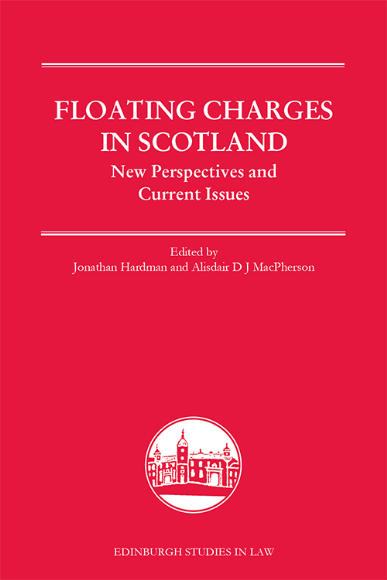
by Jonathan Hardman and Alisdair MacPherson
This Q&A with Jonny Hardman and Alisdair MacPherson introduces their new edited collection for EUP series Edinburgh Studies in Law: Floating Charges in Scotland: New Perspectives and Current Issues.
**Throughout the blog, Dr Alisdair MacPherson will be referred to as AM and Jonathan Hardman will be referred to as JH.**
Tell us about the book?
AM: The book is an edited collection about floating charges in Scots law. A floating charge is a very useful and common form of security granted by companies. It gives protection to a bank or other creditor but still enables the debtor company to use its assets and deal with them for business purposes. The creditor can appoint an administrator or (less commonly nowadays) a receiver if the debtor company breaches its obligations (e.g. by failing to pay debts that are due). By having a floating charge, a creditor obtains priority over certain other creditors if the debtor’s assets are distributed on insolvency. Interestingly, floating charges in Scotland were an adapted legal transplant from English law, and have been academically controversial since their arrival in 1961. Yet, they remain very popular in practice.
JH: As well as writing chapters of our own, chapters have been contributed by other leading commentators on floating charges and connected matters (Dr Ross Anderson, Professor George Gretton, Dr Jennifer Gant, Dr Magda Raczynska, Professor Donna McKenzie Skene and Professor Andrew Steven). The book’s contents examine floating charges from different perspectives and discuss various issues regarding what floating charges are and how they work.
When and why did you decide to work on this book?
AM: The idea for the book was born outside a Zizzi restaurant in Edinburgh in 2018. We had just been introduced for the first time by Andrew Steven due to our overlapping research interests. We had both researched and written about this area of law and had separately identified the desirability of a (relatively) holistic account of floating charges.
JH: As a parting comment we said that there was an edited collection on the topic waiting to be written. Within a week, I emailed Alisdair to ask whether he was serious, and the project was officially started by a phone call about 2 hours later.
AM: Although a lot had been written about floating charges in Scots law, often in response to legal developments, particularly case law and legislation, there was no book that considered floating charges from a number of different perspectives and which covered many facets of the law. We decided to co-lead a project to rectify that!
JH: The project was originally scheduled to be finalised over 2020, but the COVID-19 pandemic put paid to that ambition.
What specific topics or issues does the book cover?
AM: The book is divided up into three parts: (1) the history of floating charges; (2) theoretical, comparative and policy perspectives; and (3) practice, doctrine and the future.
The first part examines the “pre-history” of floating charges in Scots law (i.e. prior to their introduction by legislation), security granted by Scottish statutory companies (which were very significant in creating and operating infrastructure in the nineteenth and early twentieth centuries), the process by which floating charges arrived in Scots law, and the somewhat troubled story of floating charges in Scots law since their introduction in 1961.
The second part contains a law and economics analysis of the floating charge in Scots law, as well as an examination of moral hazard and how floating charges affect employees and other vulnerable and involuntary stakeholders, an analysis of floating charges using the work of the American jurist Hohfeld, and an analysis of the Scots law floating charge from an English law perspective.
The final part features chapters dealing with, in turn, the complex rules by which floating charges are ranked against competing rights, the relationship between floating charges and insolvency law, empirical consideration of floating charges and, finally, a chapter on the potential reform of this area of law. In addition, Lord Drummond Young, a leading expert on commercial law, very kindly provided a foreword to the book.

Which parts did each of you write?
JH: We each contributed a couple of chapters on our own, and collaborated together on two more. You never truly know someone until you have collaborated with them, they have edited your work and you have edited theirs.
Alisdair’s own chapters have a strong historical aspect, so are in the first part; my chapters are primarily theoretical, so appear in the second part. The collaborations appear in the third part.
So is it only an academic book?
JH: Not at all! The book is suitable for commercial law enthusiasts, including practitioners, judges, academics and students. It should also have practical utility in clarifying the law relating to floating charges.
AM: We hope readers will enjoy the book and we are happy to discuss its contents with them! For those who would like to obtain a copy, it can be purchased directly from EUP and from various bookshops both online and in person.
Want to keep up to date on things Law? Sign up to our mailing list.

New Perspectives and Current Issues
Edited by Jonathan Hardman, Alisdair MacPherson
Pre-order your copy here
Leading experts cover history, current law, practice and reform to provide the definitive text on floating charges
- Examines floating charges from a wide range of different perspectives, including doctrinal, policy-focused, theoretical and comparative approaches
- Contributions from Ross G. Anderson, Jennifer L. L. Gant, George L. Gretton, Jonathan Hardman, Alisdair D. J. MacPherson, Donna McKenzie Skene, Magda Raczynska and Andrew J. M. Steven
- Includes a foreword by Lord Drummond Young
About the authors

Dr Jonny Hardman was in private practice for 10 years before moving to academia. Jonny researches corporate and commercial law and has published in a wide range of outlets.

Dr Alisdair MacPherson is Lecturer in Commercial Law at the University of Aberdeen. He is the author of The Floating Charge (2020) and editor of Avizandum Statutes on Scots Commercial and Consumer Law. His work has also been published in leading law journals.





